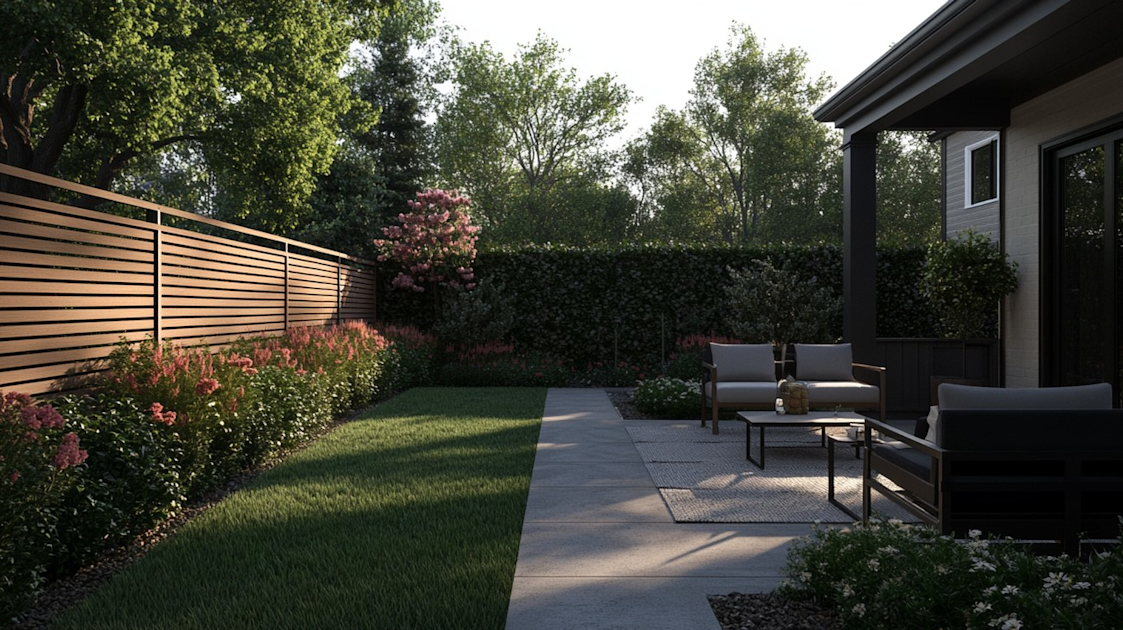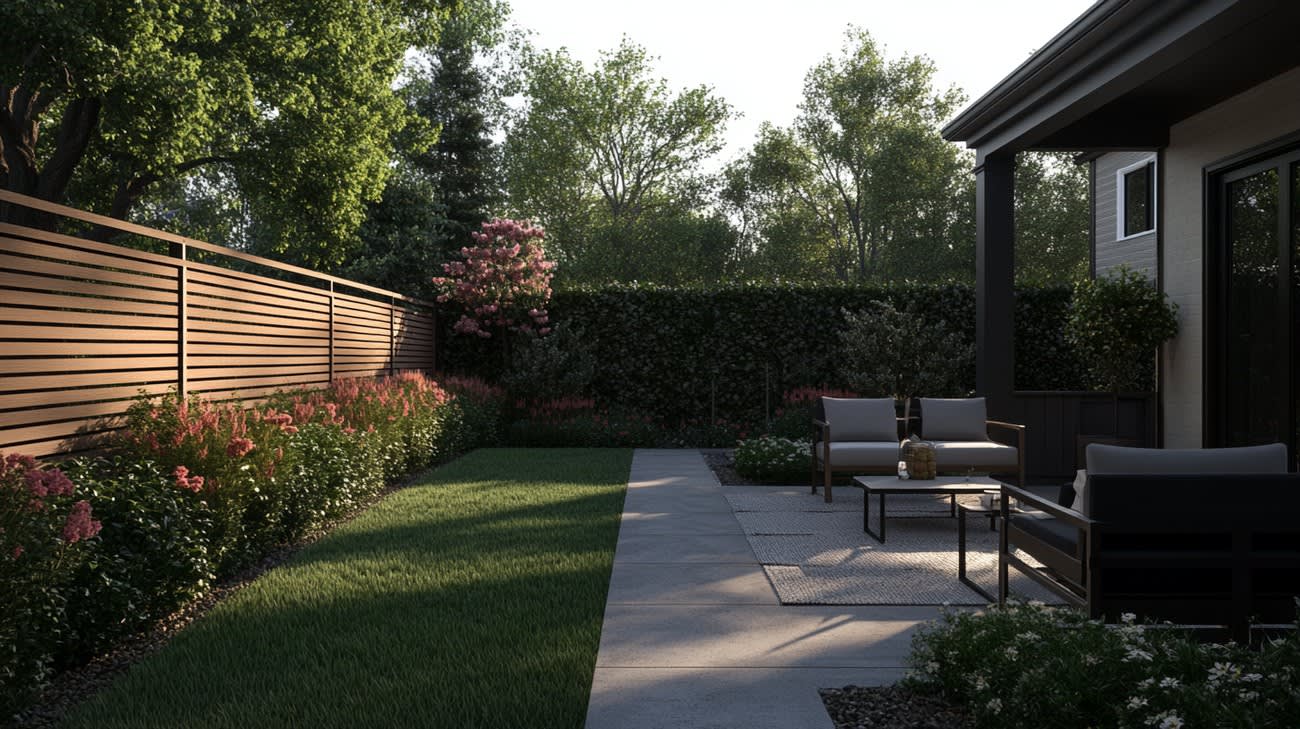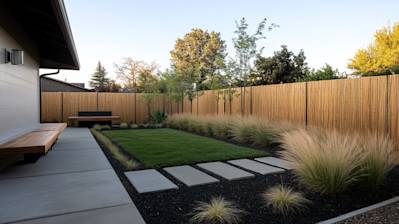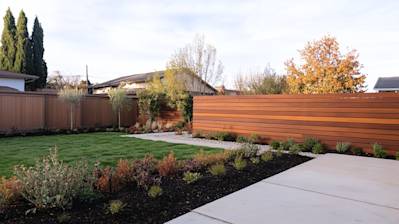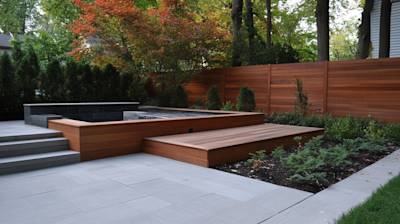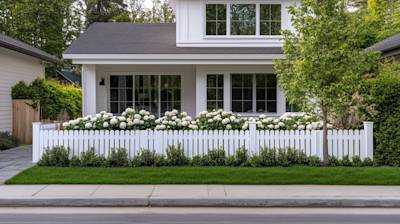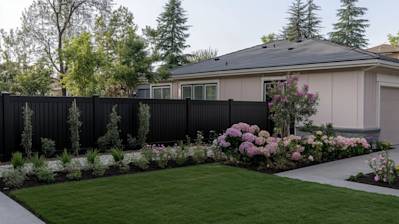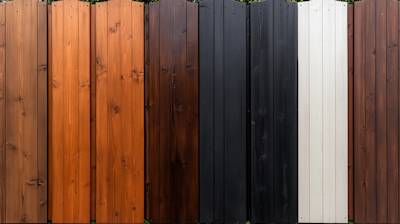There is a growing interest among homeowners to accent their landscape with more than just greenery. A significant part of creating an aesthetic and safe home is picking the right fence. Two of the most prominent contenders are Wood and Vinyl. This article will delve into every important detail distinguishing wooden fencing from vinyl.
Wooden and Vinyl fences tend to hold the market in firm grip thanks to their striking features and inherent qualities. SEO Rich headings, detailed descriptions, advantages, and careful considerations are woven into the article to help you make an informed choice.
Introducing Wood Fencing
Classicly organic and economical, wood fencing is a common sight in many suburban and rural areas. Wood fences are known to add a warm, timeless appeal to any property.
The Styles of Wood Fencing
Wooden fence designs are incredibly adaptable. They come in a myriad of styles, including:
- Picket Fencing - Popular for suburban homes, providing a perfect blend of security and appeal.
- Panel Fencing - This style ensures absolute privacy while still looking homely and welcoming.
- Post and Rail Fencing - Ideal for large yards or farm properties where you need demarcation rather than privacy.
The Durability Factor – Wooden Fence
Wood is a biodegradable material but with a good deal of maintenance, wood fencing can last for many years. The longevity varies with the type of wood used – cedar and redwood fencing, for instance, have a lifespan of 15 to 30 years.
The Cost – Wooden Fence
Wooden fences come with a lower initial price tag, making them appealing for homeowners on a budget.
Introducing Vinyl Fencing
Constructed from synthetic plastic, vinyl fencing provides a visually pleasing and low-maintenance alternative to other fence materials.
The Styles of Vinyl Fencing
Vinyl fences come in versatile designs to suit diverse aesthetic preferences:
- Privacy Fencing – These offer maximum privacy, with panels close enough to prevent any peeping.
- Semi-private Fencing – These fences, while providing enough security, leave some space for the outside world.
- Picket Fencing – Vinyl’s version of the suburb-friendly option, for those looking for aesthetic and durability in one package.
The Durability Factor – Vinyl Fence
Being a non-biodegradable material, vinyl won’t rot, warp, or splinter. Vinyl fencing is also insect resistant and can thrive remarkably well against harsh weather conditions. They can last anywhere around 20 to 30 years.
The Cost – Vinyl Fence
The upfront cost of vinyl fencing can be higher compared to wood fencing. However, considering the maintenance costs, vinyl might be a cost-effective option in the long run.
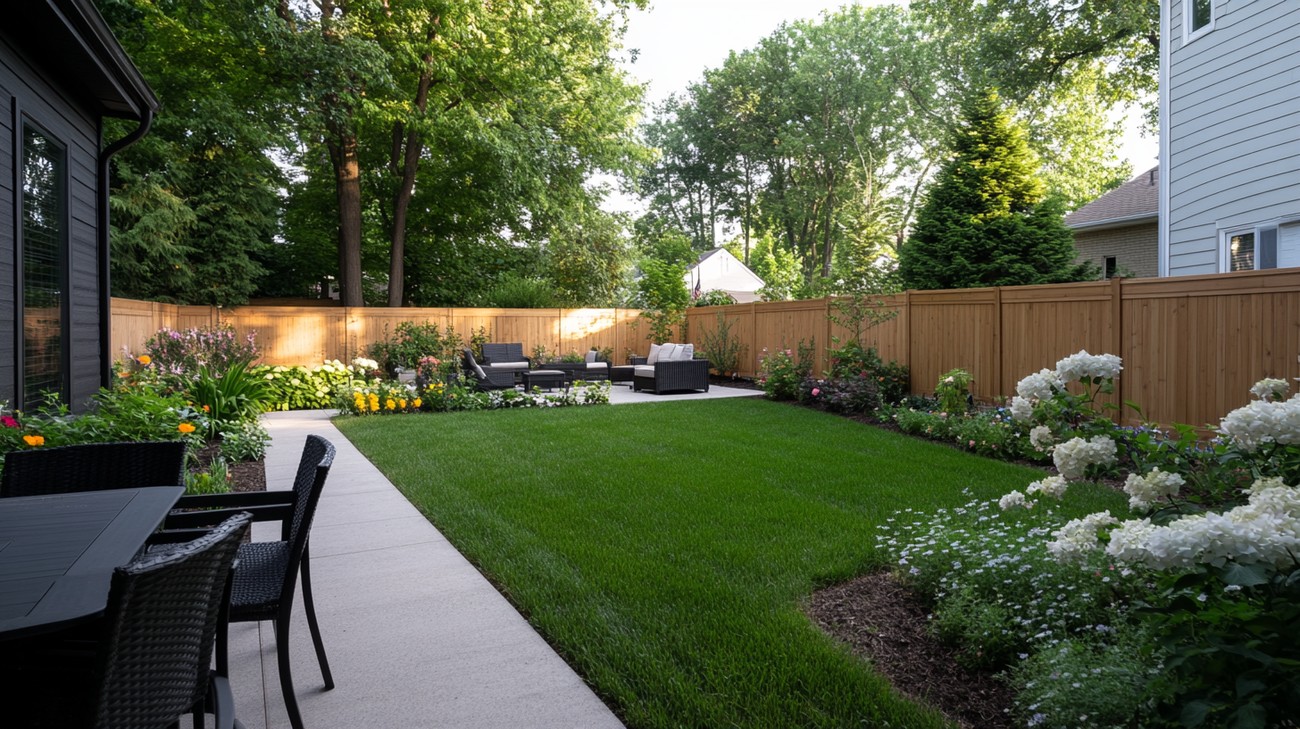
Frequently Asked Questions about Wood Vs Vinyl Fencing
Will I Have to Do More Maintenance with a Wood Fence or a Vinyl Fence?
A wood fence requires more maintenance than a vinyl one. Wood fences can be prone to problems like insect damage, rotting, and weather-related wear and tear, which necessitates regular painting, staining, or sealing. Vinyl fences just require a quick wash with soapy water from time to time.
Is There A Price Difference Between Wood and Vinyl Fencing?
Yes, there's a noticeable price difference between these two materials. Initially, vinyl fencing may cost more than wood fencing. However, considering its durability and the minimal maintenance needed, some homeowners find vinyl fencing more cost-effective in the long run.
Can I Install a Vinyl Fence or Wood Fence on My Own?
The installation process for both vinyl and wood fencing can be complex. Though having a bit of DIY experience can help, hiring a professional installer is usually recommended to ensure a securely installed fence.
Between Vinyl and Wood, Which Fence Material Offers More Privacy?
Both vinyl and wood fences can offer a great deal of privacy, depending on the style of the fence. Privacy fences, with their tall panels and little to no spacing between them, offer the most privacy, whether constructed from wood or vinyl.
Does One Material Outlast the Other in Terms of Color Fading?
Vinyl fences are more resistant to color fading compared to wood fences. Sun exposure and harsh weather can fade the color of a wooden fence over time. On the other hand, vinyl fences are made with pigment throughout the material, which means they tend to hold their color for a longer period.
Does a Vinyl Fence Look As Good as a Wood Fence?
The aesthetic appeal of a fence can be subjective and depends on personal preferences. Some people prefer the traditional look of a wooden fence, while others might favor the sleek appearance of vinyl fencing. Nowadays, vinyl fences are available in various colors and styles, including those mimicking the look of wood, broadening their appeal.
How Environmentally Friendly are Wood and Vinyl Fences?
Wood fences are considered more eco-friendly as they are made from a natural, renewable resource. In contrast, vinyl fences are made from plastic, a non-renewable resource. However, many manufacturers are producing vinyl fencing using recycled materials, which could offset some of the environmental concerns.
Are There Any Weight Differences Between Wood and Vinyl Fences?
Yes, weight differences do exist. Vinyl fences tend to be lighter compared to wooden fences. While this has no notable impact on daily use, it can make a difference during installation, often making vinyl fences easier and quicker to install.

Wood Fencing Pros
Natural Aesthetic
One of the primary advantages of wood fencing is its natural, rustic appearance. Wood can be a beautiful addition to your home's exterior design and offers plenty of options for customization. You can paint, stain, or leave it unfinished for a rugged look. It adds a warm tone and traditional quality to any landscaping design.
Cost-effective
In terms of upfront costs, wood fences tend to be cheaper than their vinyl counterparts. Because of the prevalence and accessibility of wood, these types of fences are generally easier on the budget. This affordability makes them an attractive choice for homeowners on a budget.
Easier to Repair
Unlike vinyl fencing, wooden fences are easier to repair because individual boards can be replaced without affecting the structural integrity of the entire fence. This makes maintaining a wooden fence relatively simple and cost-effective.
Versatility
Wooden fences also offer versatility in terms of design. They can be cut to any height and are easy to shape or style according to your specific taste. This flexibility allows for creative expression and a custom fence that perfectly suits your home.
Wood Fencing Cons
Maintenance
Wood fences require consistent maintenance. To maintain their look and prolong their lifespan, wood fences need to be painted or stained every couple of years. In climates with high humidity or rain, wood fences are susceptible to rot and may require treatments to prevent this.
Durability
In comparison to vinyl, wood is a less durable material. It is prone to warping, rotting, and insect damage which can lead to additional maintenance costs. The lifespan of a wooden fence is significantly shorter than vinyl, often leading to more frequent replacement.
Environmental Impact
Wood fences contribute to deforestation, which is a significant environmental concern. Although some suppliers offer sustainably-sourced wood, not all wood is sourced responsibly, contributing to deforestation.
Vinyl Fencing Pros
Durability
One of the major advantages of vinyl fencing is its durability. Vinyl fences are resistant to insects, water, and sunlight damage. They don't rust, warp, or rot and can withstand harsh weather conditions. They are also non-toxic and safe for use around children and pets.
Low Maintenance
Vinyl fences require virtually no maintenance. Unlike wood, it doesn't need regular painting or staining, and cleaning is straightforward and easy, usually requiring only soap and water.
Longevity
Due to their resistance to damage and environmental factors, vinyl fences tend to have a much longer lifespan than wood fences. This longevity can make the higher initial cost more worthwhile over time.
Variety
There are many varieties and styles of vinyl fences available, including privacy, picket, and decorative styles. Also, there's a wide range of colors available, and the color runs through the material, so scratches or scuffs are less noticeable.
Vinyl Fencing Cons
Upfront Cost
One of the downsides to vinyl fencing is the high upfront cost. Vinyl is more expensive initially than wood, which can deter some homeowners.
Difficult to Repair
Unlike wood fences, when a vinyl fence gets damaged, it's often necessary to replace the entire panel instead of just a few boards, leading to increased repair costs.
Temperature Sensitivity
In very cold weather, vinyl can become brittle and may crack more easily, while extreme heat can make it less rigid and more prone to warping.
Environmental Impact
While vinyl fences have less of an impact on deforestation, they are not biodegradable and can be difficult to recycle. This can lead to waste contribution with their disposal. It also requires a fair amount of energy to manufacture vinyl fences, adding to its environmental footprint.

Myths and Misconceptions About Wood Vs Vinyl Fencing
Myth 1: Vinyl Fencing is More Expensive Than Wood Fencing
Misconception
This is a popular misconception about vinyl and wood fencing. Many people believe that buying a vinyl fence will cost them more upfront than purchasing a wooden one. Although it's true that the initial expense for a vinyl fence can be greater, the long-term cost analysis paints a different picture.
Fact
If you consider the cost of maintenance, repairs, and possibly replacing wooden fences over time, vinyl tends to be a more cost-effective choice. Vinyl fencing is more resistant to weather elements and doesn't need to be repainted or stained regularly like wooden fences. Over the years, the expenses saved on maintenance and repair work can easily offset the higher initial cost of a vinyl fence.
Myth 2: Wood Fences are More Durable than Vinyl Fencing
Misconception
Another common myth is that wood fences are more durable than vinyl ones. Many people believe that wood, being a natural and robust material, can withstand more abuse and last longer than a synthetic material like vinyl.
Fact
In reality, vinyl fencing has proven to be a more durable and long-lasting option. Vinyl doesn't rot or get infested by pests like wood can. It's resistant to weather damage, doesn't fade under sunlight, and isn't prone to warping or splitting. While wooden fences may need to be replaced every 10 to 15 years, vinyl fences can last upwards of 20 years or more with minimal upkeep.
Myth 3: Vinyl Fences Look Unnatural
Misconception
There's a persistent belief that vinyl fences only come in bright, glossy white, making them look artificial and less aesthetically pleasing than wooden fences.
Fact
While it's true that vinyl fencing was initially only available in a limited array of colors, modern manufacturing techniques have expanded the variety. Today, vinyl fences come in different styles and a multitude of colors, including those that mimic natural wood grain. As such, they can be just as visually appealing as wooden fences, if not more so.
Myth 4: Wood Fencing is Better for the Environment
Misconception
Since wood is a natural material and vinyl is a product of petroleum, there's an assumption that choosing a wooden fence is more eco-friendly than opting for a vinyl one.
Fact
While wood is indeed a renewable resource, the environmental impact of deforestation and the energy-intensive processing of turning logs into usable lumber are significant environmental concerns. Granted, vinyl production also has environmental implications. However, many manufacturers are increasingly using recycled materials, making vinyl fencing a more sustainable option in some cases. Additionally, the long lifespan and low maintenance requirements of vinyl fences contribute to less overall waste, further decreasing their environmental footprint.
Myth 5: Wood Fencing Offers Better Privacy
Misconception
Some believe that wood fencing provides better privacy due to its natural opacity.
Fact
The privacy offered by a fence depends more on its design rather than the material. Both wood and vinyl fencing can be designed with privacy in mind, with choices ranging from solid panels to shadow box designs. As such, either type can provide an equal level of privacy depending on the specific model chosen.
Summary
So, the discussion of "Wood vs Vinyl Fencing" ultimately comes down to a few key factors. If you're going for a classic, natural look and don't mind a bit of maintenance, wood fences are worth considering. They add charm to your home but need consistent care to prevent decay or any kind of damage.
However, if you're looking for durability and low maintenance fencing, vinyl is a top-notch choice. No worry about rot or insects, plus it's really easy to clean. Though the upfront cost might be higher than wood, its longevity makes it a good investment in the long run.
All things considered, the choice between wood and vinyl fencing depends on what you're looking for. There's the authentic look and feel of wood fencing versus the durability and convenience of vinyl. It's important to weigh the pros and cons according to your preferences and needs before choosing your fence material.
About Ornamental Solutions
Ornamental Solutions, based in the heart of Rancho Cordova, CA, is your go-to destination for all things ornamental. We pride ourselves on transforming spaces with our unique collection of ornamental fittings. We offer a variety of items, including ornamental metals, architectural elements, and custom pieces. What sets us apart is our unwavering commitment to quality and our passion for giving customers' spaces just the right touch of charm and character. Come check us out and experience how we can make your space uniquely beautiful!

